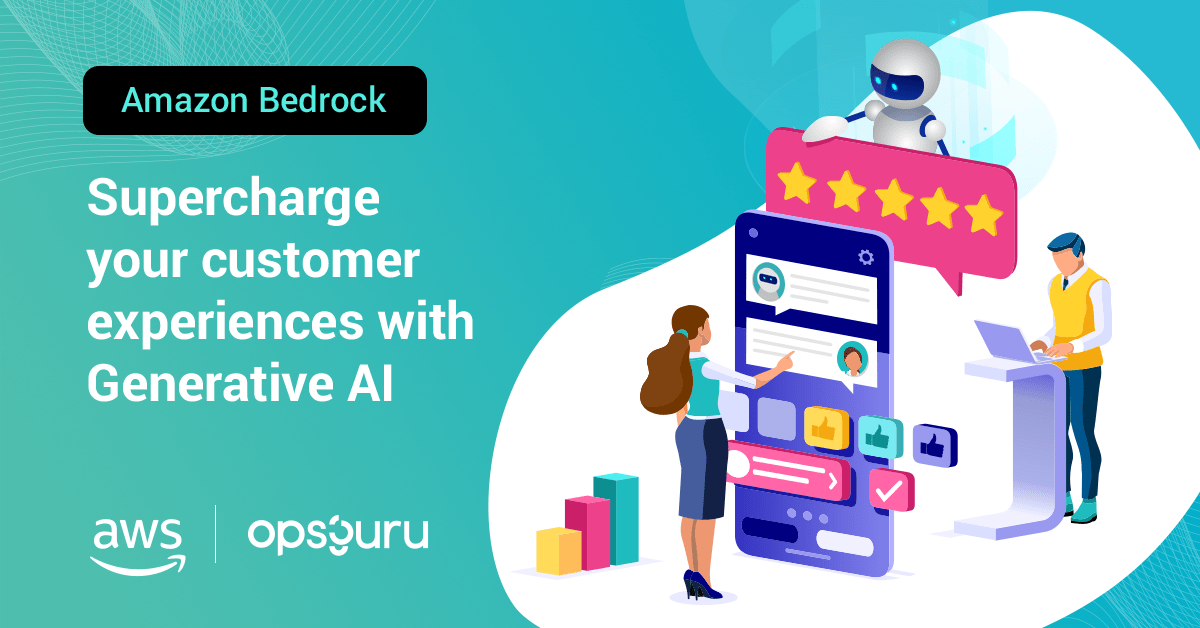OpsGuru Achieves AWS Generative AI Competency
OpsGuru is proud to announce that we have achieved the AWS Generative AI Competency, further solidifying its position as an AWS Premier Partner and a leader in Generative AI solutions....

There’s plenty of data available online that shows how critical customer service is for business success. A whopping 95% of consumers say that after-sales service is essential for brand loyalty, and 60% of consumers report having deserted a brand and switching to a competitor because of poor customer service. At the same time, cost controls and a clear return on investment are top of mind for everyone.
In these challenging circumstances, enterprises have been relying on chatbots more than ever to provide customers with answers to common questions and reduce the workload of overly strained contact centres.
Unfortunately, these chatbots are either easy or incredibly hard to implement without a middle ground. In the former case, they provide subpar-quality responses that only frustrate customers. In the latter case, they require extraordinary technical investments and specialized, hard-to-find expertise to simply retrain and maintain the bot’s quality.
At AWS re:Invent 2023, AWS announced the new Knowledge Bases for Amazon Bedrock service, which promises to change the game when building customer service products with Generative AI (GenAI), eliminating the need for model re-training by leveraging Retrieval Augmented Generation (RAG). For customer service chatbots, Knowledge Bases can act as an external repository for business context. AI models can provide responses that are informative, precise, and contextually enriched based on the vast data stores companies maintain.
Here, we’ll explore a chatbot for a coffee chain that leverages GenAI to effectively respond to customer inquiries. By integrating customer survey data into a Bedrock Knowledge Base, businesses can empower their Generative AI systems to engage in more meaningful dialogues. For instance, when a customer inquires about a product feature or expresses a concern, the AI can retrieve specific feedback from the knowledge base to provide a tailored response. This action demonstrates an understanding of the customer's issues and conveys that their feedback is valued and considered.
First, we upload the desired context documents to an S3 bucket. The Bedrock Knowledge Bases platform is adept at handling a diverse array of content types, ranging from Frequently Asked Questions (FAQs), product manuals, and customer service transcripts to more structured formats such as spreadsheets containing product information or CSV files cataloging customer feedback. Whether the data is presented as text, Markdown, HTML for web-based content, PDFs, Word documents, Excel files, or CSVs, Bedrock Knowledge Bases facilitates their automatic ingestion.
Next, we create a Knowledge Base with a vector store—a specialized database designed to organize and retrieve data based on content similarity. OpenSearch Serverless is the default vector store for its ease of use and scalability, although alternative options can also be utilized to fit different needs.
During the ingestion process, documents are broken down into smaller, digestible pieces called chunks. These chunks are then converted into embeddings, which are numerical representations that capture the essence and context of the text, making it understandable for the AI. These embeddings are then stored in the vector store. As the knowledge base evolves, it continues to automatically incorporate and index new content, ensuring that the AI's responses remain dynamic and up-to-date.
Finally, we can connect our chatbot client to the pre-built RAG infrastructure with a single call to the new RetrieveAndGenerate API. Knowledge bases will convert user queries into embeddings, do a similarity search with the knowledge base to find relevant context, and trigger a response generation from a foundation model.
What used to be a complex workflow requiring many custom-built integrations is now as simple as adding business data to S3 and calling an API! The customer service chatbot now knows of frequently asked questions and past customer surveys, which it uses to provide precise, personalized customer responses.
By leveraging the new Knowledge Bases for Bedrock feature, you can employ advanced GenAI techniques to provide a superior customer experience in a fraction of the time. By integrating context and customer survey data into these knowledge bases, companies can create AI systems that not only generate responses but do so with an informed understanding of customer sentiment.
These AI systems bring an additional layer of sophistication to these interactions. Language models are equipped to gracefully handle scenarios where information may be incomplete. They excel in formulating probing questions that can extract more nuanced details, enriching the conversation and gathering the necessary context to provide accurate responses. The result is a superior experience provided to your customer by an AI that doesn't just speak but engages in a conversation rooted in their needs.
The application of GenAI also plays a crucial role in the iterative improvement of AI models through reinforcement learning from human feedback. As AI systems interact with users and process their feedback, they can detect patterns and preferences. This information can be used to refine the AI's decision-making processes, leading to more accurate and user-aligned responses over time.
As we continue to push the boundaries of what's possible with Generative AI, Bedrock's Knowledge Bases stand as a testament to the potential of AI to not only process information but to comprehend and act upon the wealth of human feedback.
In this context, OpsGuru’s expertise can help your business unlock its innovation potential to enhance customer responsiveness, and power new services and business models using Data & AI. If you want to explore how your business can unlock its innovation potential, get in touch with us.